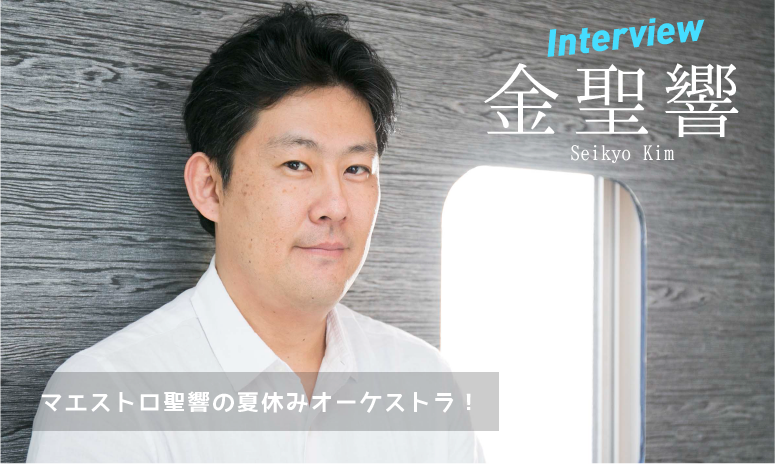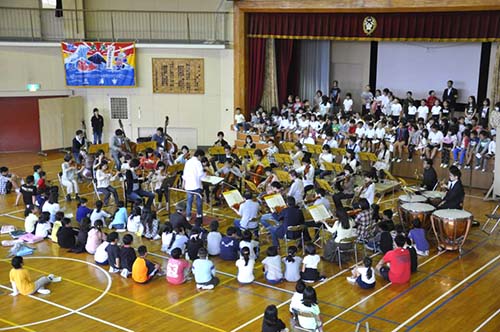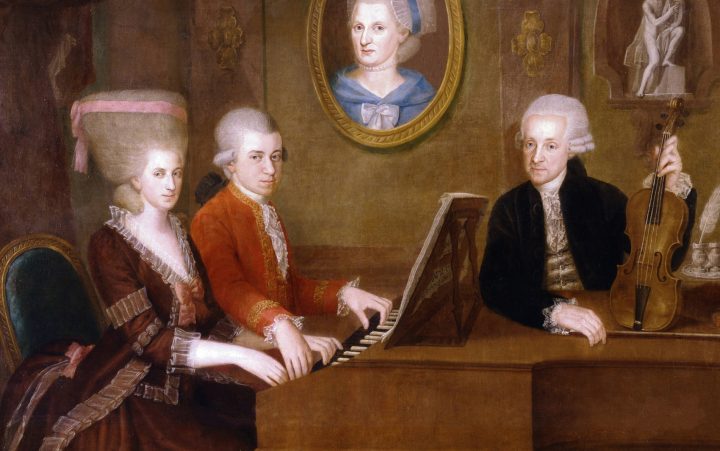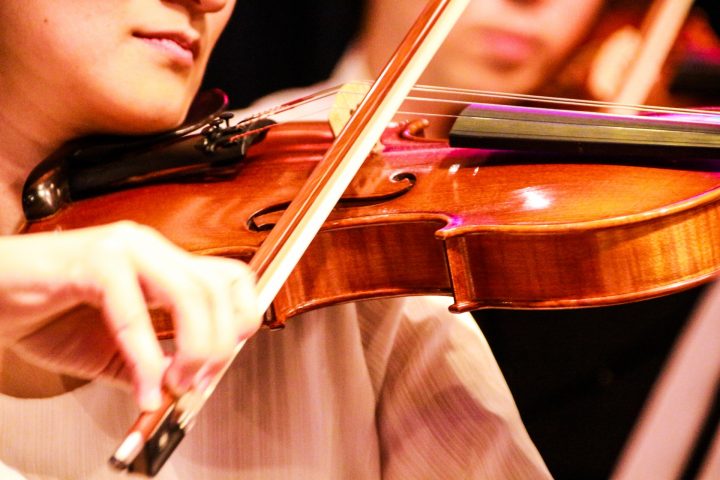
What prompted you to start this program?
Kim : In the summers of 2009 and 2010, I did a performance for children with the Kanagawa Philharmonic Orchestra at Minato Mirai Hall, but we decided not to do it from the following year. At that time, Director Ito asked me if I would like to do a performance with children's participation at the Prefectural Music Hall. I asked him if I would like to continue it for five years if I were to do it. 2011 was my third year as the permanent conductor of the Kanagawa Philharmonic Orchestra under a three-year contract, but I wanted to continue this project for five years even after I left the Kanagawa Philharmonic Orchestra, and this is the fifth year, which is a milestone, and I think it's a wish come true that I have been able to continue it.
How did you decide on the content of the program?
Kim : At first, I was feeling my way around and talking with the staff at the music hall. Until then, I had been performing concerts for children with other orchestras, and I felt that there were areas for improvement. I thought it would be interesting to incorporate that, as well as what I had been able to achieve up until then and what I had not yet achieved, and to pack in all the good things. Of course, I wanted them to listen to the rehearsals, and I wanted them to go up on stage for the performance, not just in the audience.
There was a performance that gave me a hint. It was during the Claudio Abbado era, when the Berlin Philharmonic had four regular concerts, and on the morning of one of the free days, everyone dressed up in the same formal attire as for the evening performance in a small hall, and seriously played the same symphony as the regular performance for children around 3 to 7 years old. The acoustics of the orchestra reverberating in the small hall were also quite impressive, but even more than that, it was a performance that made the audience experience that what adults do seriously is actually very scary and not easy. It was not at the level of what you would call "appreciation." It was like, "Try to catch a 150 km fastball!" I intuitively thought that this would be a good idea, so I used it as a reference when thinking about the program.

--It's not just one concert, but a four-day program, so isn't that a lot of work?
Kim : It's not that difficult because we have a division of roles. At the mini concert on the first day, we have a soloist play a short sonata, and then we listen to the orchestra rehearsal, and then I talk to the children. I wanted to talk to the children and find out what they were thinking. When I was told about this program, I didn't have any negative thoughts about it, but actually, I didn't know much about children at first. I could roughly imagine what kind of parents bring their children to this kind of program, and I'm the same age as the parents. I learned a lot by talking to the children directly.
This program not only takes place over four days at the music hall in August, but every year you also make outreach visits to elementary schools in Kanagawa Prefecture with the orchestra.
Kim : So far, we have been to Odawara, Nakai, Yamakita, and Manazuru in Kanagawa Prefecture, and this year, in May, we went to Misaki Elementary School in Miura City. Everyone sat on the ground in the hot gymnasium, and we were in the same place, talking and playing. The first year, it was July, and it was so hot that I almost got heat stroke, so after that, we started doing outreach in cooler seasons (laughs). During the first year's performance, a girl sitting at the front said to me, "Big brother, are you okay? You're really sweating!" I was a little confused because I still didn't know how close I was to the children. I go out as if it were work, but I'm always nervous about whether they will find it interesting. I would be happy if even one child becomes interested in music through this opportunity. I think children who can have such an experience of seeing adults working in children's everyday situations are lucky. It's once a year, but I would like to go every month, actually.

Photo: From the "Orchestra Has Arrived in Miura City" event held in May
--It seems like the songs you play on the program are chosen with great care.
Kim : Every year, we carefully consider and decide on the schedule with the production of the music hall and the Kanagawa Philharmonic Orchestra. We also take into consideration the children's concentration and pay attention to the length of each piece. We only play one movement of a large piece. It is difficult to arrange the first movement of each piece while considering the overall structure, but since this is a project like this, I think we have to include a lot of good pieces. What I am most particular about is making sure to include modern pieces. I also believe that Beethoven's works are very memorable, so I make sure to include some movement of Beethoven every year.
Why do you always include contemporary music in your children's programs?
Kim : We feature composers who are alive today because we want people to know that works are still being written and will continue to be written in the future. You can't know the goodness, the fun, and the difficulty of a piece without trying it, so you shouldn't dislike it. In the first year, we included a 6- or 7-minute piece by Boulez. Looking at the questionnaires from that time, people wrote that it was surprisingly interesting. Even adults sometimes have trouble concentrating on modern music, so we don't choose pieces that are longer than 15 minutes. But I think that once children get into it, they can concentrate quite well. In a questionnaire from a past performance, an adult wrote that it was the first time they had heard modern music live. Even adults don't have the experience of listening to modern music. Even if a child thinks that a piece is good and interesting, if the mother who comes with them says, "There's something strange about it," the child will think, "Oh, it's a strange piece."
--Can't we change things without first reforming adults?
Kim : Yes. That's why I will incorporate more and more contemporary pieces without hesitation. I want people to listen to Beethoven, Brahms, and Fujikura Dai's music that will be performed this year without preconceptions. However, I think it will take some getting used to, so I want people to listen to the open rehearsal and feel the energy leading up to the performance, and I will also talk to them before the performance so that they can enjoy listening. Sensitivity doesn't matter to age, whether it's an adult or a child. I want people to listen to music composed by living composers and feel various things freely. Fujikura's "The Fifth Station" has an interesting performance style.
One part of the program is "Dialogue with Conductor Kim Seiki." This is a direct confrontation with the children that you don't see at other children's concerts, and it's a thrilling experience that is different from the performance.
Kim : As I said before, I wanted to know what children were thinking. As a child, I hated being called "○○-kun" by adults as if they were trying to look at children's eyes. So now that I'm an adult, I basically talk to children normally, without any discrimination. Things like, "What do you like to do?", "Nap time," and "Nap time is great."
What kind of child were you?
Kim : I was a naive kid who liked games and soccer. I was from the Nintendo generation, so I liked games. I didn't study. My parents took me to concerts in a bow tie and shorts. But I always slept. I don't remember anything from when the orchestra started to when the show started until the end (laughs). I just enjoyed the performance. My parents didn't approve of what I wanted to do, and they didn't set me up for it. That's why I understand the feelings of parents who bring their children to this kind of program. This program wouldn't be possible without the parents' desire to let their children listen to classical music in the first place. The little customers might grow up to be musicians. I think how happy it would be if the children who came to see us again, or the children who listened to us at that time, fell in love with music, went to music college, and made their professional debut. It would be wonderful.

--After participating in the dialogue four times, has there been any change in the way you interact with children?
Kim : I think the way I look at my children has obviously changed since my first year. Last year, my wife got pregnant, and I think the density of my relationship with my children has changed even more. I think it's good that adults are scary. It's not easy for musicians like us to become musicians, and I hope that they will see that we are doing it seriously and understand that there are other professions like this. Also, it's great to play music in a regular concert format, but there are so many options nowadays that I think it's difficult to get children interested unless we reach out to them and get closer to them.
-- What specific discoveries did you make?
Kim : I was surprised at the huge difference in mental age between junior high school students. Some are more adult-like in their mentality, while others are still more like elementary school students. I found it interesting to see that it's not about age, but about each person. There were some mature kids who made me want to tell them they don't need to think so hard. Another kid is now 9 years old and asked, "I play the violin and piano. What should I do next?" Of course, that's what he wants to do, and he wants to become a conductor in the future. All I said was, "Eat good food, move your body, and play. You can't do it without stamina. Just play as much as you can." His mother might be angry if I say that. There will be a lot of educational mothers at the venue (laughs). One kid who conducts at high school came with a bunch of sheet music.
--It seems to me that the children, while fearful, also respect the conductor Kim Seiki as an artist who does not pander to children or go easy on them.
Kim : For me personally, it's important to enjoy it. Of course I'm very happy that people come every year, but I'd also like to see a lot of first-time audience members come and listen with a fresh feeling and excitement.
Text: Yuki Mihoko Photo: Nishino Masamasa
Profile of Seikyo Kim
Born in Osaka Prefecture in 1970. He moved to the United States at the age of 14, studied philosophy at Boston University, and completed a master's degree in conducting at the New England Conservatory. He participated in the Tanglewood Music Festival as a scholarship student and studied under Seiji Ozawa. He studied under Yuji Yuasa and Leopold Hager at the University of Music and Performing Arts Vienna. In 1998, he won the Nikolai Malko International Conducting Competition. Since then, he has performed at music festivals such as the Pacific Music Festival (PMF), and has guest-performed with orchestras both in Japan and abroad. Overseas, he has received acclaim for his guest performances with the Danish National Radio Symphony Orchestra, the Orchestre de la Lamoureux in Paris, the Seoul Philharmonic Orchestra, and the Orchestre de Flanders in Belgium. He has also guest-performed with major orchestras throughout Japan. He became the principal conductor of the Kanagawa Philharmonic Orchestra in April 2009, and the artistic partner of the Orchestra Ensemble Kanazawa in December of the same year. He also served as the principal conductor of the Flanders Symphony Orchestra in Belgium from 2010 to 2012. The "Mahler Series" with the Kanagawa Philharmonic Orchestra, which began in 2010, was very well received and continued until 2013. As for CDs, he conducted the Orchestra Ensemble Kanazawa and began a project to record all of Beethoven's symphonies in 2003, which was completed in May 2011 with the release of "Beethoven: Symphony No. 4 and No. 8." In addition, the project to record all of Brahms' symphonies, which began in 2007, was completed in September 2009 with the release of Symphony No. 4 and the complete set. His third book, co-authored with author Masayuki Tamaki, "Mahler's Symphonies," was published by Kodansha Gendai Shinsho in December 2011.



